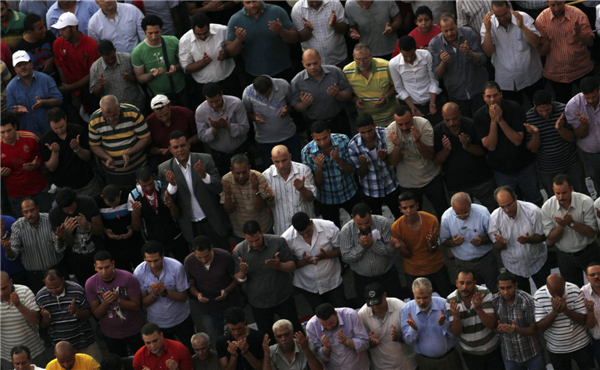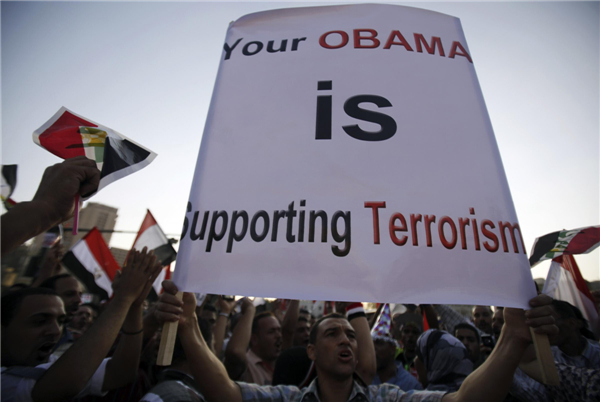Huge crowds rally in Egypt, political talks stalled
 |
|
Protesters who are against deposed Egyptian President Mohamed Morsi perform evening prayers during a protest at Tahrir square in Cairo, July 7, 2013. [Photo/Agencies] |
For many Islamists, the overthrow of Egypt's first freely elected president was a bitter reversal that raised fears of a return to the suppression they endured for decades under autocratic rulers like Hosni Mubarak, himself toppled in the 2011 Arab Spring uprisings.
The Brotherhood has said it wants nothing to do with the military's plans for a new interim government. It wants Morsi reinstated and has pledged to keep protesting until he is.
The military has shown no sign of moving to dislodge the Islamists and may be hoping that sweltering summer heat and the onset of the Ramadan Muslim fasting month from Tuesday will gradually wear them down.
State media reported that the public prosecutor had ordered four top Brotherhood leaders arrested this week to be detained for a further 15 days on accusations of inciting violence against protesters.
Authorities have sealed the burned-out national headquarters of the Brotherhood, and the offices of its political arm, the Freedom and Justice Party, as part of the investigation.
US lawmakers expect continued support
 |
|
A protester who is against former Egyptian President Mohamed Morsi shouts slogans and holds a placard against US President Barack Obama during a protest at Tahrir square in Cairo, July 7, 2013.[Photo/Agencies] |
Washington has not condemned the military takeover or called it a coup, prompting suspicion within the Brotherhood that it tacitly supports the overthrow.
Obama has ordered a review to determine whether annual US assistance of $1.5 billion, most of which goes to the Egyptian military, should be cut off as required by law if a country's military ousts a democratically elected leader.
But US lawmakers said that was unlikely to happen.
"We should continue to support the military, the one stabilizing force in Egypt that I think can temper down the political feuding," US Representative Mike Rogers said on CNN's "State of the Union".
Egypt can ill afford to lose foreign aid. The country appears headed for a looming funding crunch unless it can quickly access money from overseas. The local currency has lost 11 percent of its value since late last year.
The governor of Egypt's central bank, Hisham Ramez, flew to Abu Dhabi on Sunday, officials at Cairo airport said, following Egyptian media reports Cairo was seeking financial aid from Gulf states after Morsi's removal.
Egypt's foreign reserves fell $1.12 billion in June to $14.92 billion, representing less than three months of imports.
Only about half are in the form of cash or in securities that can easily be spent, and the IMF considers three months to be the minimum safe cushion for reserves.
- Egypt's Islamists stage mass rallies against Morsi's ouster
- Egypt's prosecution imposes travel ban on Morsi
- Morsi held by Egypt army; West has 'coup' dilemma
- Jubilant crowds celebrate after Morsi overthrown
- Morsi says he is still 'legitimate' president of Egypt
- Ouster of Egypt's Morsi not to influence Gaza
- Protesters in Tahrir Square show Morsi the 'red card'





















